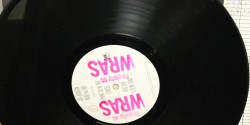Students at Georgia State University (GSU) are still processing the news about changes coming to college radio station WRAS in a few weeks, when Georgia Public Broadcasting (GPB) will begin airing daytime programming over WRAS’s 88.5 FM signal. Over the weekend, WRAS supporters held protests at GSU graduation and the social media blitz continues. Additionally, a benefit show was held last night at the Drunken Unicorn in Atlanta. In a press release dated May 13, the staff of WRAS reaffirmed their opposition to Georgia State’s deal with GPB and also requested a meeting with university president Mark Becker. The press release states,
Going forward, WRAS staff continues to review our options regarding this deal while also continuing to pursue our programming mission. Working in coordination with various other student organizations – as well as the pool of alumni and listeners – we encourage an open and respectful dialogue about the impact of these changes. WRAS publicly requests a meeting by next Tuesday (5/20/14) with GSU President Mark Becker along with Ms. Teya Ryan from GPB to discuss the details of this agreement and answer questions we may have. Staff has yet to receive any direct communications from either party and we would appreciate the opportunity to discuss these changes with the two central individuals behind them.
Additionally, in its press release, WRAS points out some of the details of the GSU/GPB contract that it finds problematic, arguing that,
Not only is 100 hours of student programming being removed from our analog 88.5 FM in exchange for internships/30 minute student music program ‘opportunities’ but all of these changes were made without allowing any student input. While we understand the reasons for secrecy around ‘high stakes negotiations’ and respect GSU as the FCC licensee, failure to include students in the decision casts the administration as deaf to student voices. When a similar deal was proposed to WREK by GPB back in 2007, the students of the station were allowed to have a say in negotiations and eventually rejected the offer. The opportunities within this deal are insufficient to the opportunities that come with running an actual 100,000-watt, highly respected radio station. In our eyes, radio as it has been, involves an analog FM signal (referred to as 88.5 FM) – not an HD2 station (referred to as 88.5-2 FM) or an online stream – and believe such a signal builds a community unlike that of streaming.
While the lack of student input in this decision is troubling to WRAS, there’s also concern about possible programming changes to the student-controlled evening programming as well. In an interview with CMJ, outgoing WRAS General Manager Anastasia Zimitravich says,
The administrators suggested that we pay attention to our ratings, and choose ‘accessible’ music to air after the GPB programs end at 7 p.m. Hopefully by carefully marketing our analog broadcasts, we can ‘have the opportunity to increase our listenership’. A listenership that is undoubtedly going to suffer from this agreement.
The GSU administration has made it very clear that ratings and demographics mattered in their decision to share our airtime. It is my fear, that if our demographics continue to linger in the 30-60 range and our ratings continue to suffer in comparison to GPB’s, that we will lose all of our analog to GPB in a deal reevaluation.
With programming changes set to occur on June 2nd and with WRAS staffers demanding a meeting regarding these changes by May 20, it will be interesting to see if any of the actions of the past week will sway GSU administrators to alter the deal with GPB. Stay tuned.
In other college radio news this week:
Catawba College Foundation Buys AM Radio Station: It’s such an unusual move, that it’s hard to believe that a college is buying a terrestrial frequency for students to use. According to the Salisbury Post, that’s exactly what’s happening at Catawba College. The new Catawba College Foundation is purchasing WSAT-AM and will continue to run the Salisbury, North Carolina station as Memories 1280, although with student involvement. The Salisbury Post reports that, “…the station will have a new purpose. It will become the platform for Catawba College students majoring in business or communication arts hoping to pursue careers in radio broadcasting.” The school also plans to add a sports communication program and hopes to offer students on-air opportunities at WSAT.
Soundtap Madness Begins: Soundtap’s head-to-head college radio listening competition, Soundtap Madness, started on Monday with 64 stations vying for bragging rights as the most listened to station. Round 3 began at midnight today, with the number of competitors whittled down to 16 stations. The final round concludes May 22-23.
We cover the culture of college radio every Friday in our College Radio Survivor feature. If you have college radio news to share, please drop us a note at EDITORS at RADIOSURVIVOR dot COM.



